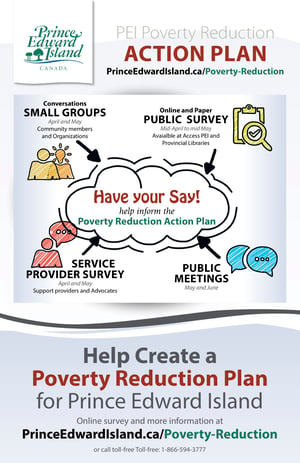On November 14, 2017, the Government of Prince Edward Island (P.E.I.) committed to a Poverty Reduction Plan as part of the province's Throne Speech, and more recently, appointed a 12-person multi-sectoral advisory committee to bring forward short and longer-term solutions to poverty in a Poverty Reduction Plan. The Plan is expected to be ready for fall 2018 and will include actions in the areas of housing, food security, education and employment, says Committee Chair, Roxanne Carter-Thompson.
 The Poverty Reduction Strategy is a Call-To-Action to All Islanders
The Poverty Reduction Strategy is a Call-To-Action to All Islanders
The province is being intentional about engaging everyone - representatives from all sectors - but importantly, all Islanders. They use the tagline "poverty is a community challenge," recognizing that everyone has a role to play and that great work is already occurring in various sections of the community that can be built from.
The province's recently released
discussion paper, providing a framework for community consultations, summarizes the challenge at hand and puts into perspective that no one lives untouched by the impacts of poverty:
Prince Edward Island is not immune to poverty and its effects on individuals, families, and our entire community. According to the 2016 census, one in six (over 23,000) Islanders lived in low income in 2015, while the same is true for one in seven Canadians (4.8 million people) - Government of Prince Edward Island, 2018
With the Advisory Committee selected and work under way, the group is now in a phase of engagement and discussion with Islanders to understand what poverty really looks like in P.E.I., the community's top priorities, and collaborative solutions to address poverty in the region.
Expanding the Poverty Discussion
As Islanders are called to action to gather and discuss the Plan, it creates an important opportunity to expand the discourse around poverty, to take it beyond economic indicators and to raise awareness about the complex and interrelated barriers that people living in poverty are faced with. The discussion paper recognizes that poverty is not defined alone by income or wealth - that it is multi-faceted and that all parts are inextricably linked with others (ex. housing and food insecurity). It also identifies that certain parts of the population are more at-risk of being excluded from participating in and benefiting from the growing, vibrant economy - such as women, youth, seniors, and newcomers.
Carter-Thompson says that so far the small group discussions are going really well. Community organizations that have been doing this work for decades are showing up and collaborating with the private sector, government, the faith community, and others. They are mobilizing their strong, established relationships that they have formed over the years with various pockets of people across the province, and are enabling everyone to have their voice heard in the creation of the Poverty Reduction Plan.
Deborah Bradley, Family and Human Services Director of Planing, Policy and Innovation, Government of P.E.I, adds that it was the collaborative nature of developing the engagement process - from planning to implementation - that has been a critical component of their success to date. The community, especially service providers, have been important champions in the work as they go "tip-to-tip" across the province to engage all Islanders.
Get Involved
The P.E.I. Poverty Reduction Plan community engagement is happening from now until June 2018. Two of ten small group discussions are still upcoming, as well as six community conversations, an open public online survey, and a targeted survey for service providers to submit their feedback. If you are a resident of P.E.I. or would like to learn more about the process, visit their website here.
If you would like to keep informed about the P.E.I. Poverty Reduction Plan by receiving email updates, you can also sign up for their mailing list.
Government's Role in Ending Poverty
These developments in Prince Edward Island come on the heels of Ontario's 2017 Poverty Reduction Strategy Annual Report, which exemplifies how governments developing and implementing robust strategies with measurable targets and clear timelines are critical for having a real impact on poverty.
All provinces and territories, along with the Federal Government for the first time, now have or are developing poverty reduction plans, in addition to or alongside, the introduction of progressive legislation and policy at all levels. There is much indication right now that achieving an end to poverty in Canada is possible within a generation.
Take Your Learning Further






